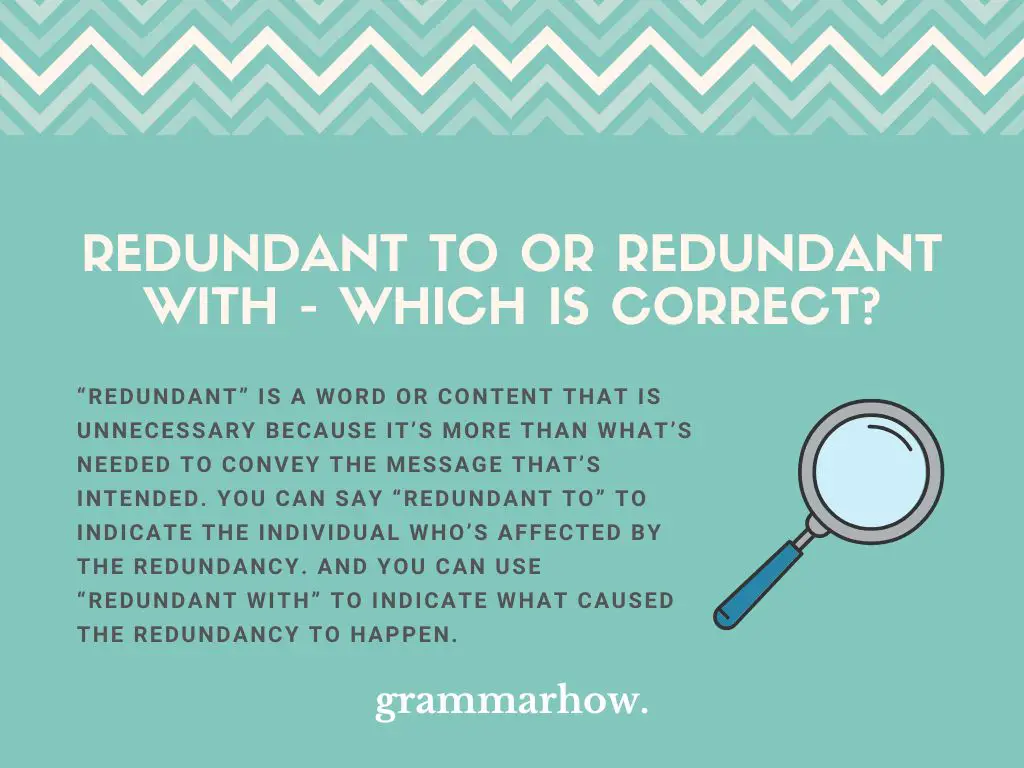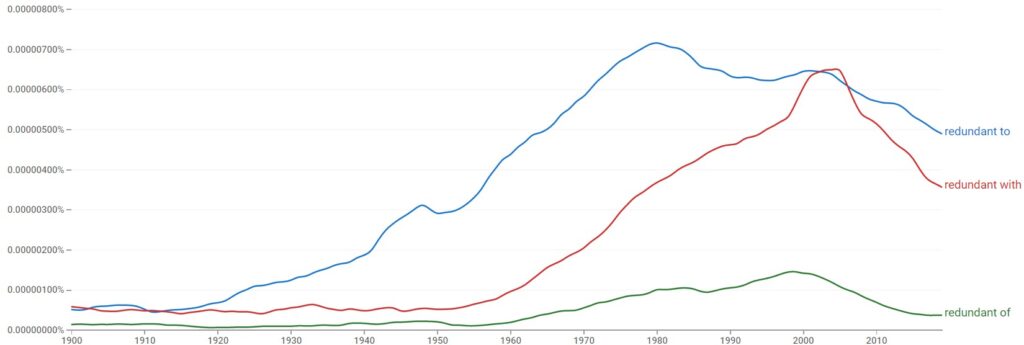How do you describe something redundant, do you say “Redundant To” or “Redundant With”?
If there’s something none of us want to be when communicating is redundant. So we want to know what’s the acceptable form and which one to avoid. Let’s find out!
Redundant To or Redundant With – Which Is Correct?
“Redundant” is a word or content that is unnecessary because it’s more than what’s needed to convey the message that’s intended. You can say “Redundant To” to indicate the individual who’s affected by the redundancy. And you can use “Redundant With” to indicate what caused the redundancy to happen.

Take a look at the examples, to clarify those concepts:
- Leonard’s words sounded redundant to me.
- Certain game consoles became redundant with the creation of online gaming systems.
The first sentence indicates the subject’s opinion about Leonard’s words. In this case, “Redundant To” indicates who had an opinion about the redundancy of Leornard’s word.
In the second sentence, “Redundant With” is used to indicate that online gaming turned certain game consoles into something unnecessary. The redundancy happened because of online gaming and, in that scenario, “Redundant With” is a phrase that makes sense.
Redundant To
“Redundant” is a word that often works well alone. You can say something is “Redundant” plain and simple, with no need for a preposition. “Redundant To”, however, works well to indicate who thinks something’s redundant or who’s affected by the redundancy.
Take a look at the examples below:
- This project seems redundant to the class.
- Georgia’s actions looked redundant to me like she was just trying to show off.
- His repeated apologies sounded redundant to the whole team.
- Anthony’s words were redundant to me. (incorrect)
- Anthony’s words were redundant.
All sentences in the examples are correct. We want to point out sentences 4 and 5. Sentence 4 states that someone’s words were “redundant to me”, indicating that the listener’s opinion was that those words were unnecessary.
Sentence 5 sends the same message just by saying the person’s words “were redundant”. In that scenario, to say “Redundant To” is in itself redundant and unnecessary. Keep that in mind as you construct your sentences, you should keep them clear and objective.
Redundant With
“Redundant With” can be used to indicate what caused the redundancy, and what led the content or actions in question to become excessive and unnecessary. Oftentimes, the word “Redundant” can be used as a stand-alone, do keep that in mind to avoid being redundant yourself in your content.
- Some workforce has become redundant with the advent of new technology.
- Milo can sound redundant with all his repeated ideas.
- Be careful and avoid being redundant with your arguments on your final paper.
- Please stop me if I become redundant with you. (incorrect)
- Please stop me if I become redundant.
“Redundant With” can be used to indicate what’s caused something to become redundant. But always remember that “Redundant” often works well alone, with no prepositions. Take a look at sentences 4 and 5, for example.
Sentenced 4 uses the phrase “Redundant With”. But sentence 5 clearly shows it was unnecessary. The full phrase wasn’t needed to convey the intended message.
Redundant Of
“Redundant Of” is usually an incorrect form that you shouldn’t use in your sentences. “Of” is a preposition that doesn’t go well with “Redundant”, because those words mostly make no sense together – except when saying something like “Redundant Of You”, or “Redundant of Me”.
Let’s take a look at some examples of “Redundant Of” being incorrectly used, followed by the corrected version of the sentence.
- The redundant of the lyrics made the song boring. (incorrect)
- The redundant lyrics made the song boring.
- The redundancy of the lyrics made the song boring.
- Carla always seems redundant of me, because she repeats her words too much. (incorrect)
- Carla always seems redundant to me, because she repeats her words too much.
- It’s redundant of you to keep persisting on this subject.
Which Is Used the Most?
Which one of those forms is used more often, “Redundant With”, “Redundant To” or “Redundant Of”? Take a look at the graph from Google Ngram Viewer below.

As expected, simply because it’s usually an incorrect phrase, “Redundant Of” is placed at the bottom of the graph, as the least used phrase.
“Redundant To” and “Redundant With” are now the most used and the second most used expressions, respectively. However, it’s interesting to notice that those words have been through oscillations and have already swapped places at the top of the graph.
Final Thoughts
“Redundant” is a word that usually works very well by itself. It can be accompanied by prepositions in certain cases. Use “Redundant To” to indicate who’s affected by the redundancy. And use “Redundant With” to clarify who or what caused the redundancy to happen.

Martin holds a Master’s degree in Finance and International Business. He has six years of experience in professional communication with clients, executives, and colleagues. Furthermore, he has teaching experience from Aarhus University. Martin has been featured as an expert in communication and teaching on Forbes and Shopify. Read more about Martin here.
